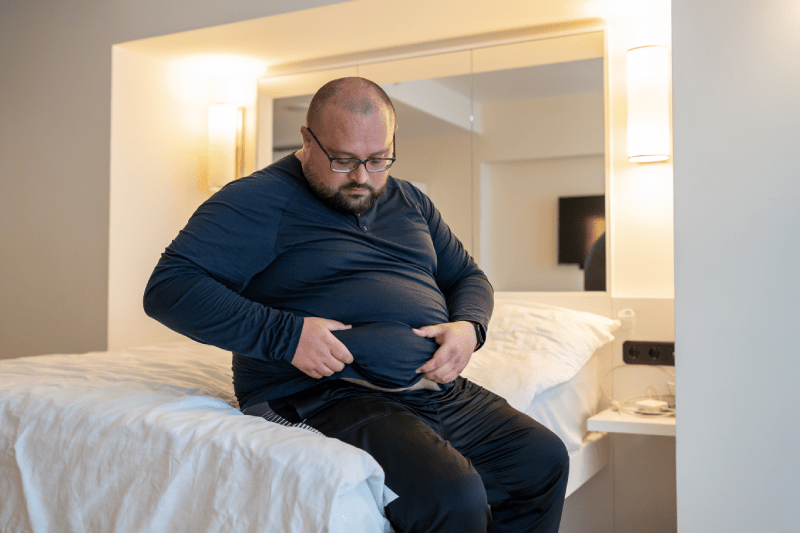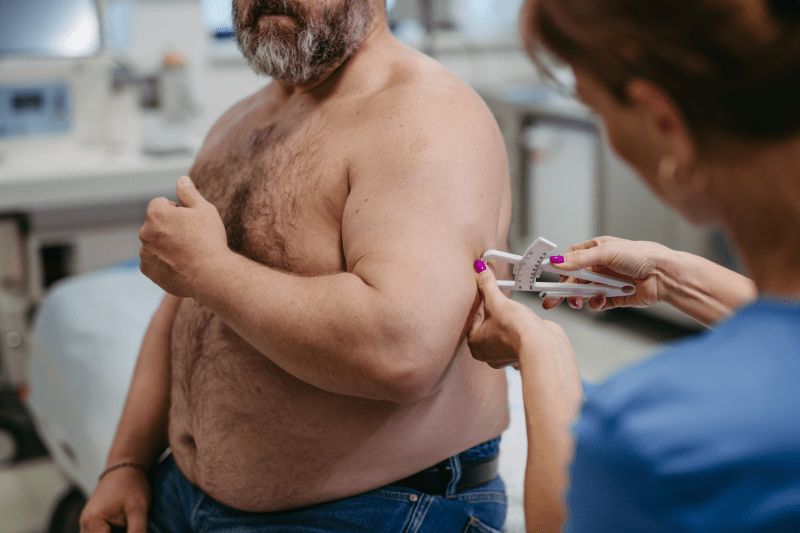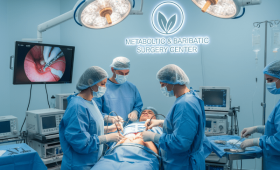Obesity is a multi-dimensional disease that deeply affects every aspect of an individual’s life and threatens public health on a global scale. Beyond personal health risks, excessive weight often leads to social stigmatization, discrimination in professional life, and a general loss of self-confidence. This situation drives individuals towards increasing social isolation and a higher risk of depression.
Being overweight is more than just a physical condition; it is a chronic psychosocial challenge that undermines a person’s self-acceptance and desire to participate in life. Gastric bypass surgery should be considered one of the most crucial steps taken to break this vicious cycle and rebuild the patient’s physical and social well-being concurrently.
The Insidious Progression and Definition of Obesity
Obesity is a progressive disease characterized by the abnormal and excessive accumulation of fat, starting when the Body Mass Index (BMI) exceeds 30. Although it may progress slowly at first, it can quickly reach critical levels due to metabolic deterioration and hormonal imbalances. This condition not only increases body weight but also triggers dangerous visceral fat accumulation around the internal organs. This insidious progression turns obesity into the primary disease, with Type 2 Diabetes and hypertension becoming secondary complications. Therefore, early and effective treatment of obesity means not just losing weight, but also protecting vital bodily functions for the long term.

Decrease in Quality of Life Due to Weight
Excessive weight significantly reduces the quality of life by making even daily activities difficult to perform. Tasks such as climbing stairs, tying shoelaces, or walking short distances can become arduous challenges. These physical limitations cause the person to withdraw from hobbies, social activities, and even simple household chores. The decreasing level of physical activity, in turn, creates a cycle that further accelerates weight gain and physical decline. Gastric bypass is the most powerful intervention available, enabling patients to shed significant weight, break free from these physical restrictions, and return to a more energetic and fully active life.
Why Traditional Diets Often Fail?
In cases of severe obesity, traditional diets and exercise programs typically result in failure in the long run. The main reason for this is that obesity stems not only from calorie intake but also from underlying hormonal imbalances. During weight loss efforts, the body enters a self-preservation mode by slowing down its metabolic rate and increasing levels of Ghrelin, the hunger hormone. This strong biological response causes the patient to feel constantly hungry and struggle to adhere strictly to their diet. Gastric bypass overcomes this hormonal barrier and reprograms the appetite mechanism, creating a decisive turning point for sustainable weight loss.
Obesity and the Risk of Heart Disease
Obesity is a leading cause of serious cardiovascular diseases, including coronary artery disease, heart attack, high cholesterol, and uncontrollable hypertension. The excess weight places a constant strain on the heart muscle and contributes to the stiffening of blood vessels. The rapid and significant weight loss achieved with gastric bypass lowers blood pressure, improves cholesterol levels, and reduces stress on the heart muscle. These metabolic improvements substantially protect the patient’s heart health and dramatically decrease the risk of future cardiovascular events, thereby extending life expectancy significantly.
The Connection Between Obesity and Type 2 Diabetes
One of the most striking benefits of gastric bypass surgery is its rapid and powerful ameliorating effect on Type 2 Diabetes. While excessive fat tissue triggers insulin resistance, bypass surgery breaks this resistance through both weight loss and the rearrangement of gut hormones. The rerouting of food through the digestive system instantly increases insulin sensitivity, allowing many patients to achieve complete remission of their diabetes shortly after the surgery. Consequently, Gastric Bypass is recognized as the most effective metabolic surgical solution for Type 2 Diabetes, being far more than just a weight loss tool.
Joint Problems Arising from Excessive Weight
Every extra pound carried by the body places a destructive strain on weight-bearing joints, especially the knees, hips, and ankles. This constant load leads to the erosion of joint cartilage, chronic pain, and the development of osteoarthritis. The resulting pain and restricted mobility create a vicious cycle that makes exercise impossible and triggers further weight gain. The sustained weight loss achieved with gastric bypass rapidly alleviates the pressure on the joints, reduces the patient’s dependence on pain medication, and facilitates a return to an active lifestyle, restoring overall mobility.
Psychological Burden: Self-Confidence and Social Isolation
Individuals living with obesity often struggle with continuous feelings of judgment, shame, and failure. Withdrawal from social environments, low self-esteem, and even clinical depression are common psychological consequences of excessive weight. The physical transformation following gastric bypass surgery transforms not only the patient’s body but also their mental health and self-confidence. The improved appearance, increased desire for active social participation, and a rise in overall happiness levels are the most concrete indicators of the psychological success of the surgery.
Sleep Apnea and Respiratory Problems
Obesity is the main cause of obstructive sleep apnea syndrome, primarily due to the fat tissue accumulated around the neck. This condition causes breathing to cease during sleep, preventing proper rest, leading to daytime fatigue, and putting stress on the heart. The weight loss achieved with gastric bypass surgery eliminates the pressure on the airway, resolving sleep apnea completely in a large majority of patients. This improves not only sleep quality but also vital oxygen saturation levels, thereby boosting overall health and energy levels.
How Does Obesity Disrupt Hormonal Balance?
Excessive fat tissue actively disrupts the body’s hormonal system. For example, fat cells secrete inflammatory cytokines that worsen insulin resistance. Furthermore, the balance of hormones controlling hunger signals, such as Ghrelin, is disrupted. Gastric bypass rapidly corrects these hormonal imbalances by altering the flow of food through the stomach and small intestine. It increases the levels of satiety and metabolism-regulating hormones like GLP-1 secreted by the intestines, playing a key role in the long-term success of the surgery.
What is Gastric Bypass Surgery?
Gastric Bypass (Roux-en-Y Gastric Bypass) is one of the most effective and time-tested bariatric surgical methods used in the treatment of obesity. In this surgery, a small part of the stomach (a pouch of about 30 ml) is created, and this small gastric pouch is directly connected to the lower part of the small intestine. This procedure creates two primary effects: First, it restricts food intake; second, by causing food to bypass a large portion of the duodenum, it reduces nutrient and calorie absorption and triggers metabolic effects.
The Dual Effect of Bypass: Restriction and Malabsorption
The success of gastric bypass surgery relies on the simultaneous functioning of both physical restriction and metabolic absorption change. The small gastric pouch allows the patient to feel full with very little food (restriction), while the rerouting of food past the initial section of the small intestine reduces the body’s capacity to absorb fat and calories (malabsorption). Furthermore, it alters the release of gut hormones, suppressing appetite and rapidly improving diabetes. This dual mechanism makes the bypass a more powerful option than the Gastric Sleeve for patients with a higher BMI or severe diabetes.
The Difference from Gastric Sleeve: Malabsorptive Feature
The fundamental difference between Gastric Bypass and Gastric Sleeve is that the bypass has a malabsorptive component. While the Gastric Sleeve only provides restriction by reducing stomach volume, Gastric Bypass both reduces the stomach’s volume and alters the digestive tract’s path, reducing calorie and nutrient absorption. This malabsorptive effect makes the bypass a more effective metabolic tool, particularly for the remission of Type 2 Diabetes and the maintenance of long-term weight loss. However, this feature also makes lifelong vitamin supplementation absolutely vital after the surgery.
Who Are the Ideal Gastric Bypass Candidates?
Gastric bypass surgery is typically recommended for patients with a Body Mass Index (BMI) of 40 and above, or those with a BMI between 35-40 who have uncontrollable Type 2 Diabetes, severe heart disease, or other serious obesity-related comorbidities. Pre-surgery, patients are expected to be psychologically and physically ready to adhere to the lifelong nutritional rules and mandatory vitamin supplementation required by the operation. Being a bypass candidate requires not only a desire to lose weight but also a firm commitment to adopting a permanently healthier lifestyle.

Duration of Bypass Surgery and Laparoscopic Advantages
Gastric bypass surgery usually takes longer than Gastric Sleeve because it involves a more complex reconstruction; it typically lasts between 2 and 3 hours on average. This surgery is also performed using the modern minimally invasive laparoscopic (keyhole) method. The laparoscopic approach requires only a few small incisions in the abdomen. The advantages include fewer scars, less post-operative pain, a shorter hospital stay (usually 3-4 nights), and a faster return to daily life. Centers in Turkey routinely perform this minimal invasive technique with high expertise.
The Metabolic Solution Against Type 2 Diabetes
Gastric bypass offers a structural solution to the treatment of Type 2 Diabetes that goes beyond pharmacological therapies. The surgery allows food to reach the lower part of the small intestine faster, increasing the release of beneficial hormones like GLP-1 and PYY secreted by the gut. These hormones stimulate the pancreas to produce insulin and rapidly reduce the cells’ resistance to insulin. This metabolic effect is so potent that a large majority of patients can stop needing insulin and oral anti-diabetic medications immediately after the surgery, even before weight loss begins.
The Importance of Post-Operative Nutritional Changes
Bypass surgery necessitates a radical change in eating habits and diet. Due to the small size of the stomach pouch, patients must consume small portions. Because of the absorption change, adopting a diet rich in protein and low in fat and sugar is vitally important. Adherence to the post-operative stages—liquid, then pureed, then solid foods—meticulously prepared by a dietitian, both prevents complications and guarantees lasting weight loss. Cure Holiday provides continuous nutritional guidance to its patients throughout this essential process.
Potential Risks of the Bypass Operation
Gastric Bypass is a major surgical intervention, as effective as it is important. Potential risks include leakage, bleeding, infection, anesthesia complications, and, in the long term, the formation of internal hernias. One of the most serious long-term risks is vitamin and mineral deficiencies due to malabsorption. These risks are minimized by ensuring the surgery is performed by a highly experienced surgeon and a multidisciplinary team in a JCI-accredited hospital. Patient compliance with lifelong vitamin supplements is critical for managing long-term risks.
Long-Term Weight Control Success of the Surgery
Gastric bypass is one of the bariatric surgery methods with the highest long-term and sustainable weight loss success rates. Patients typically lose 65% to 85% of their excess weight within the first 18-24 months and maintain a significant portion of this loss 10 years and beyond. The secret to success lies in the operation’s utilization of both restrictive and hormonal effects. However, this success must be reinforced with lifelong commitments such as regular vitamin supplementation, healthy eating, and physical activity.
Vital Supplements: Vitamin and Mineral Requirements
Due to the malabsorptive effect of bypass surgery, it becomes difficult for patients to absorb vital nutrients like iron, B12, folate, calcium, and Vitamin D adequately from food. This necessitates taking high-dose multivitamin and mineral supplements for life. Neglecting these supplements can lead to serious health issues such as anemia, bone weakness, and neurological problems. Cure Holiday provides detailed guidance and long-term follow-up to its patients regarding the correct use of these vital supplements.
Dumping Syndrome: A Condition Unique to Bypass
Dumping Syndrome is a condition unique to Gastric Bypass, resulting from the rapid passage of high-sugar or high-fat foods into the small intestine. This causes uncomfortable symptoms such as nausea, vomiting, palpitations, sweating, diarrhea, and abdominal cramps. Although a side effect, Dumping Syndrome also functions as a “behavior modifier,” encouraging patients to avoid unhealthy foods. This acts as a natural discipline mechanism, ensuring the patient adheres to healthy eating rules in the long run.
Paris’s Luxury Healthcare Sector and Costs
Paris is globally synonymous with luxury, prestige, and high-priced services. The health and aesthetic surgery sector also receives its share of this luxury pricing policy. Clinics in Paris are modern and high-quality, but this high cost largely stems from the elevated operating expenses, personnel wages, and taxes associated with the geographical location. International patients considering treatment in Paris must understand that a large portion of the fee they pay goes towards the luxury location and high cost of living, rather than necessarily superior surgical quality.
Gastric Bypass Price Ranges in Paris
The cost of Gastric Bypass surgery in a private clinic in France is quite high due to the country’s high cost of living. Prices range surprisingly between €15,000 and €28,000, depending on the surgeon’s experience, the hospital’s prestige, and the specific technique applied. This cost usually covers only the surgery, anesthesia, and a short hospital stay. However, the all-inclusive, comprehensive package service you receive through Cure Holiday in Turkey remains far below these figures, typically around 25% to 35% of the Parisian cost.
Reasons for High Prices in French Clinics
The fundamental reasons behind the high surgical prices in Paris are rooted in the general economic structure. High personnel salaries, expensive real estate and rental costs, high tax rates, and insurance expenses are directly passed onto the patient’s bill by the clinics. These factors inflate the cost of the operation, making France an economically inappropriate option for budget-conscious international patients. Patients can achieve significant budget savings by receiving the same quality service in Turkey.
Quality Standards and Accreditation Status
France is known for strict regulations and high standards in healthcare. French bariatric surgeons are well-trained. However, top-tier quality in bariatric surgery is measured not only by theoretical training but also by high case volume and practical experience. Leading centers in Turkey hold international accreditations like JCI (Joint Commission International), thus offering the same safety and hygiene standards as Parisian hospitals, but with teams that possess a much higher volume of surgical experience.

Appointment Processes and Long Waiting Lists in Paris
The most famous and experienced bariatric surgeons in Paris often have long waiting lists due to high demand and relatively limited surgical capacity. International patients may have to wait for months, sometimes up to a year, to find a suitable date for their surgery. These lengthy appointment waiting times pose a significant difficulty, especially for patients with obesity-related comorbidities who need prompt treatment. Cure Holiday offers faster and more flexible scheduling options in Turkey, thereby shortening this process significantly.
Logistical Hassle: Lack of Package Services
French clinics generally do not offer “all-inclusive” package services for international patients. The patient is expected to organize their accommodation, airport transfers, specialized medical interpretation services, medications, and post-operative nutritional counseling independently and at high costs. This adds a logistical hassle and uncertainty to the already stressful surgical process, significantly reducing the patient’s comfort. Cure Holiday solves all these details in a single package, completely removing the burden from the patient.
Language Barrier and Communication Difficulties
Although English is widely spoken in France, in a complex medical field like bariatric surgery, even the slightest communication gap or misunderstanding can lead to serious consequences. Clinics in Paris are often inadequate in providing continuous and experienced medical interpreter support in your native language. Cure Holiday in Turkey, on the other hand, provides uninterrupted interpreter and personal coordinator support in the patient’s native language as a standard service, ensuring the patient feels safe and understands all instructions completely.
High Post-Operative Accommodation Costs in Paris
Arranging hygienic, comfortable, and centrally located accommodation for the rest and recovery period after surgery in Paris is quite expensive. Even a few nights of post-operative stay can dramatically increase the overall budget. Cure Holiday’s all-inclusive packages include luxury 5-star hotel accommodation and VIP transfers, all within the fee you would pay for the surgery alone in Paris, preventing patients from worrying about extra accommodation expenses.
Long-Term Follow-up Costs and Difficulties
The long-term success of gastric bypass surgery requires lifelong regular follow-up, blood tests, and nutritional counseling. International patients who have surgery in Paris find that returning for follow-up means high-cost airfare and accommodation expenses each time. French clinics may lack the organized remote follow-up and online consultation systems offered by centers in Turkey. This logistical difficulty poses a significant threat to the patient’s long-term success.
Turkey: The Global Powerhouse of Bariatric Surgery
Turkey, particularly in the field of obesity surgery, has become an unrivaled center of expertise and experience internationally over the last decade. This is supported by government incentives, modern hospital infrastructure, and, most importantly, the high volume of cases gained by Turkish surgeons through intense international patient flow. Turkish bariatric surgeons perform far more bypass surgeries than their Western counterparts, gaining unique practical experience. This experience maximizes the quality of surgical outcomes and patient safety.
Comparison of Gastric Bypass Cost in Turkey with Paris
The total cost of gastric bypass surgery in Turkey is 70% to 75% lower than the fee you would pay for the surgery alone in Paris. This huge price advantage results from Turkey’s lower operating costs and its competitive structure in health tourism. Patients can direct this significant saving towards a high-quality surgery and a luxury accommodation experience, rather than spending it on the luxury consumption costs of Paris. This is the clearest example of getting the best value without compromising on quality.
Cure Holiday’s Unique Financial Advantage
Cure Holiday aims to provide the highest quality while protecting the international patient’s budget. The all-inclusive packages offered clearly set out the cost of the surgery while eliminating surprise costs like additional accommodation, transfer, or interpretation fees. This financial transparency and inclusivity make Cure Holiday an undisputed economic leader against the fragmented and high-priced clinic offerings in Paris. Patients can be certain they are receiving excellent value for their money.
Experience Gained from the High Case Volume of Turkish Surgeons
In a complex metabolic surgery like gastric bypass, the surgeon’s experience is the key to success and safety. Due to high international demand, bariatric surgeons in Turkey perform bypass operations at volumes significantly above the European average. This high case volume enhances the surgeons’ ability to manage even the rarest complications and apply the most suitable surgical approach for the patient’s anatomy. This deep experience significantly surpasses what Parisian clinics can typically offer.
JCI Accreditation and Clinical Safety Guarantee
Turkish hospitals collaborating with Cure Holiday hold international accreditations like JCI (Joint Commission International). These accreditations indicate that the hospitals adhere to US standards for patient safety, sterilization protocols, and operating room quality. This provides the highest level of safety and quality guarantee for international patients. This international recognition of the Turkish healthcare infrastructure allows patients to receive treatment with confidence.
Content of Cure Holiday’s All-Inclusive Packages
Cure Holiday packages are designed to meet all the needs of international patients for a single price: Surgery by an Expert Bariatric Surgeon, stay in a JCI-accredited hospital, Luxury 5-Star Hotel Accommodation, VIP transfers from the airport onwards, all necessary medications, vitamin supplements, nutritional counseling, and 24/7 Personal Coordinator and Interpreter Support in the Native Language throughout the process. This coverage is far beyond the offers found in Paris.
Personal Coordinator and Native-Language Interpreter Support
Cure Holiday offers personal coordinator and medical interpreter support that completely eliminates the language barrier and ensures the patient feels safe. This service accompanies the patient in their native language at every stage, from consultation to discharge, and even post-discharge follow-up. This support is a vital guarantee, which you won’t find in Paris, for the correct understanding of pre-operative expectations and the complete communication of post-operative instructions.
Luxury 5-Star Accommodation and VIP Transfer Comfort
The recovery period after gastric bypass is a critical time, and comfort is paramount. Cure Holiday ensures patients rest in luxury 5-star hotels and provides all hospital and airport transfers with luxury VIP vehicles. This flawless logistical organization ensures the patient feels safe and special, while eliminating the high-cost and exhausting process that the patient would have to arrange independently in Paris.

Detailed Post-Operative Dietitian and Follow-up Program
The long-term success of gastric bypass depends on the post-operative nutrition and follow-up plan. Cure Holiday provides regular nutritional counseling sessions and doctor follow-up during the first year after surgery. Patients receive continuous support for up to one year, even after returning to their home countries, through online consultations and necessary test tracking. This long-term commitment ensures patients sustain their weight loss goals and adopt a healthy lifestyle permanently.
Latest Laparoscopic Technologies for Bypass
Turkish bariatric centers continuously maintain the highest level of surgical equipment and technology due to global competition and high demand. Gastric bypass operations are performed with the least invasive and safest laparoscopic techniques. This means smaller scars, faster recovery, and a lower risk of complications. Cure Holiday guarantees the use of the latest and most reliable surgical equipment in the clinics it collaborates with.
Istanbul: The Combination of Treatment and Cultural Experience
Istanbul is one of the world’s most captivating cities, famous for its historical richness, cultural diversity, and unique location connecting two continents. Patients treated with Cure Holiday have the opportunity to spend part of their recovery period (with the surgeon’s approval) exploring this historic city. This transforms the treatment process from being solely a surgical intervention into a low-cost and enjoyable health tourism experience.
Uninterrupted Support for Long-Term Success
Gastric bypass is a lifelong commitment. Cure Holiday has established a 24/7 support system to address all of the patient’s questions and needs during the critical first year after surgery. Instant support on everything from vitamin supplements to nutritional challenges keeps the patient’s motivation high and guarantees the long-term success of the surgery. This is a service that clinics in Paris struggle to provide comprehensively.
Why Should You Choose Turkey with Cure Holiday?
If you are planning to undergo a life-changing surgery like Gastric Bypass, your priority should not only be cost but also the surgeon’s experience, the hospital’s safety, and the support you receive post-surgery. Cure Holiday in Turkey brings all these elements together, establishing superiority over Paris both financially and logistically. With high case experience, international accreditations, and an all-inclusive comfort package, Cure Holiday is the most logical and reliable solution that values both your health and your budget.
Take the First Step Towards a Healthy Life
Gastric bypass surgery is the biggest step you will take towards a healthier and longer life. Instead of dealing with the exorbitant costs and logistical hassles of Paris, trust the expertise and assurance of Cure Holiday. Contact Cure Holiday today to receive a free and personalized consultation, learn your treatment plan, and get your all-inclusive price quote. A new and healthy life awaits you!



